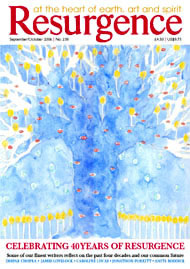DAVID PEAT’S LIFE, recounted in this autobiography, has progressively grown from a simple passion for science into an involvement with the arts and with many different forms of science as they engage with current social and ecological challenges. From a childhood idea of a science that suggests “an area of certainty in an uncertain world”, he moved to a totally different understanding. Grasping Hopkins’ notion of the world as “inscape” in which “each person, rock and tree has infinite possibility and unbounded richness,” he writes that “once we admit the inscape of the world into our lives the carpet of logical consistency is pulled out from under our feet and we discover that we are no longer standing on its firm foundations.”
The most significant influence on this growth was frequent meetings with the fellow physicist David Bohm, which continued until Bohm’s death. Peat was first impressed with Bohm’s insistence that we constantly fail to understand physics because we are dominated by the structure of our Western languages. This divides the world up into static parts represented by nouns, subsequently linked in external relationships by verbs. Yet the world as revealed by quantum physics is not built of independent parts: rather, “all is process and movement”. While Bohm’s attempts to invent an alternative language were unsuccessful, this insight bore fruit for Peat when he visited members of the Blackfoot nation and discovered there just the language that Bohm was seeking (an aspect of the American indigenous peoples that Benjamin Lee Whorf had pointed to many years earlier). This led to Peat’s influential book Blackfoot Physics and to a progressively more radical view of nature.
The arts constituted a second strand of influence. While working on quantum theory for the National Research Council of Canada, Peat’s desire to open up the scientific world to alternative ways of thinking brought him into increasing conflict with its directors, culminating in his resignation. His growing involvement with the arts and artists then led him to make a film, Memories. In the course of editing, he found that his hands “were making rapid decisions about where to cut and splice, even to the point of overruling the rational mind”, bringing home to him with greater intensity than before that “much of the creative process takes place within the body itself and out of reach of the conscious mind.” Living had become a continuous act of creation, in which the rational mind was only one member of the team. There was a wisdom in the body also, to which the rational mind often had to cede priority – something that Bohm had never been able to allow.
So Peat calls for a transformation of our society to a new order of thought that “combines intellectual rigor with creative openness” in which reason is “enriched by a new logic of compassion, harmony and love”. His own life, presented in this engaging spiritual journey, is a persuasive illustration of that much-needed transformation.
Chris Clarke is a Visiting Professor in the School of Mathematics, University of Southampton.






